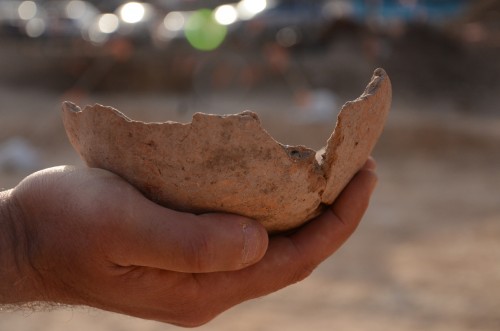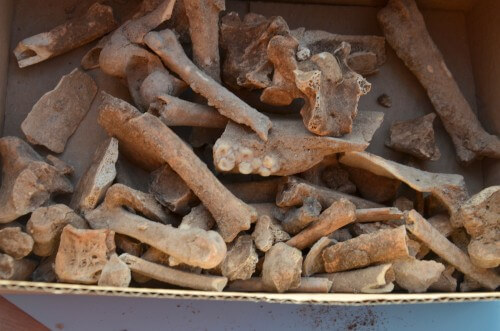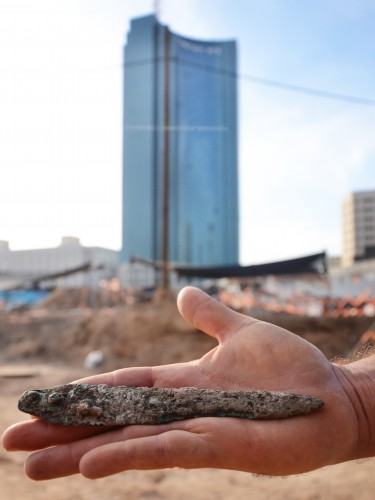Among other things, in the excavations of the Antiquities Authority, in a construction project of the Rubinstein company, fragments of ancient pottery were discovered that were used to prepare beer * Diego Barkan, the director of the excavation on behalf of the Antiquities Authority: "Tel Aviv has been a city without a break for thousands of years"

Evidence of the presence of an ancient Egyptian population from more than 5000 years ago is being uncovered these days on Hamsgar Street in central Tel Aviv, near the Ma'ariv Bridge, in archaeological salvage excavations conducted by the Antiquities Authority prior to the construction of office buildings initiated by the Rubinstein Company.
According to Diego Barkan, the director of the excavation on behalf of the Antiquities Authority, "In the excavations we found 17 pits that were used to store agricultural produce in the Early Bronze Age 1 (3000-3500 BC).
Among the hundreds of pottery fragments that characterize the local culture, several fragments of large pottery basins were discovered that were made in the Egyptian tradition, and were used to prepare beer. Straw or other organic material was added to these tools to strengthen the tools, a method that was not accepted in the local industry. Such tools were discovered in the Egyptian administrative structure excavated in Ein Hashur. From excavations done in the area in the past we knew that there was a site from the Early Bronze Age, but this excavation is the first evidence of an Egyptian settlement in the center of Tel Aviv in the period
this. This is also the northernmost evidence of an Egyptian presence in the Early Bronze Age 1: Until now, we knew of an Egyptian presence in the northern Negev and the southern coastal plain, when the northernmost point of Egyptian settlement was in the area. Now we know that they also appreciated what the Tel Aviv area had to offer, and even knew how to enjoy a glass of beer, just like today's Tel Avivians."
It is interesting to know that beer was the "national drink of Egypt" in ancient times, and it was a basic staple like bread. The beer was consumed by the entire population without differences in age, gender or status. It was made from a mixture of barley and water, partially baked and then left to ferment in the sun. Various fruit concentrates were added to this mixture to add flavor. The mixture was filtered using special tools and prepared for use. In excavations in the delta region of Egypt, beer breweries were discovered which indicate that it was produced already in the middle of the fourth millennium BC.
Barkan adds that a copper dagger (weapons) as well as a flint tool from the Chalcolithic period - about 6000 years ago - were also found at the site.
According to Moshe Ajami, archaeologist of the Tel Aviv district at the Antiquities Authority, "Today the archaeological excavations and the documentation of the area will be completed, the site is more for development and the research will continue in the Antiquities Authority's laboratories."



6 תגובות
Skeptical, there is no connection between the ancient Egyptians and those of today.
The truth is that there are, the Copts.
But the Copts just want the invaders from the Arabian Peninsula who took over their land and identity to stop abusing them.
There are also some brazen people who later migrated to the south of the country and are very aware of their Egyptian connection but outwardly call themselves Palestinians.
As far as I know the Egyptians ruled Jaffa, although I am not sure it was during the said period. Why Jaffa? Because it is a port and therefore important for control (especially if Egypt had a navy).
Those who control Jaffa and have no obstacle to move north of it may from time to time settle in the area between Jaffa and Nahal Yarkon (it is known that the Philistines held Nahal Yarkon for military purposes).
As far as I know the Egyptians ruled Jaffa, although I am not sure it was during the said period. Why Jaffa? Because it is a port and therefore important for control (especially if Egypt had a navy).
Those who control Jaffa and have no obstacle to move north of it may from time to time settle in the area between Jaffa and Nahal Yarkon (it is known that the Philistines held Nahal Yarkon for military purposes).
The image of the blade and a modern office tower in the background is thought provoking... where have we come in 5000 years
I'm not giving up on Herzliya..
What about Palestinian remains?
The Egyptians will still demand Tel Aviv back...